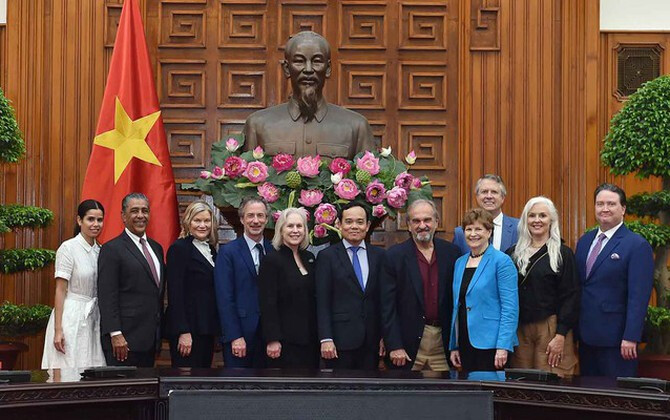
Hanoi, Vietnam – Vietnamese Prime Minister Pham Minh Chinh called on the United States to recognize Vietnam's market economy status during the 7th US-Vietnam Business Summit, highlighting the strong and evolving partnership between the two nations.
Hosted by the Vietnam Chamber of Commerce and Industry (VCCI) in collaboration with the US Chamber of Commerce and AmCham Vietnam, the summit brought together government leaders, business executives, and international stakeholders.
Chinh emphasized the principle of "harmonized interests and shared risks" as the foundation of bilateral cooperation. He urged businesses from both countries to build partnerships based on mutual understanding and a shared vision, fostering a win-win spirit that promotes mutual growth, pride, and happiness.
The Prime Minister also pressed for the US to swiftly recognize Vietnam as a market economy and eliminate outdated trade restrictions that hinder growth, particularly in high-value exports.
Chinh highlighted Vietnam's efforts to pursue three key strategic breakthroughs in the near future: institutional reform, infrastructure development, and human capital enhancement. These initiatives aim to radically reform the institutional framework by building an efficient, strong, and results-oriented administrative system. This approach seeks to reduce compliance time and costs, lower entry costs for businesses and investors, increase labor productivity, create new growth paths, and enhance competitiveness.
Vietnam is prioritizing growth by revitalizing traditional growth engines such as investment, exports, and consumption, and by promoting new drivers like the digital economy, green economy, circular and sharing economy, and knowledge economy. Concurrently, the nation is advancing under a mindset of "soaring through innovation, expanding through creation, and prospering through integration," developing science and technology, fostering innovation, and cultivating emerging fields such as cloud computing, artificial intelligence, and the Internet of Things.
Moreover, the nation is aggressively pursuing significant transformative endeavors, including nuclear power plants, the North-South high-speed railway, major airports, seaports, highways, and comprehensive transport systems. Vietnam is also prioritizing energy security, building a national data hub, and venturing into new development areas such as outer space, the underground landscape, and maritime territories. Chinh urged US businesses to strengthen cooperation and investment in these critical sectors.
The Prime Minister emphasized the importance of private sector leadership in addressing global challenges, from energy security to climate change.
Themed "Policies and Approaches to Ensure a Mutually Beneficial Commercial Relationship," this year's summit marked the first major business dialogue since the elevation of Vietnam-US relations to a Comprehensive Strategic Partnership in September 2023. Bilateral trade reached a new high last year, with two-way trade totaling $110.8 billion in 2023 and exceeding $110.9 billion in the first 10 months of 2024. Vietnam has emerged as a key player in the global supply chain, contributing significantly to various sectors such as high technology, renewable energy, and infrastructure development. Meanwhile, US businesses have been progressively increasing their investments in transformative projects, reflecting their commitment to Vietnam's economic transformation.
US Secretary of State Antony Blinken, joining virtually, underscored the mutual benefits of the partnership. "The cooperation between our two countries and the partnership between our businesses is dynamic, strong, and more robust than ever before. And they are delivering real benefits for both Americans and Vietnamese, as I've seen firsthand on my three visits to Vietnam as Secretary of State," Blinken said.
Joseph Oude, Chairman of AmCham, noted that the summit provides a crucial platform for policymaking and removing investment barriers. "With the relationship upgrade last year and the change of administration in the US, it is a critical time and a great opportunity to seek ways to upgrade the policy framework to attract new players and support the growth of existing investors and businesses," Oude said. "Progress on the key issues raised at today's summit will improve the business environment, strengthen the private sector, and ensure economic and social development, fostering Vietnam's prosperity."
Vietnamese and US delegations discussed a wide range of forward-looking topics, including expanding the digital economy, supply chain resilience, and developing green energy.
The emphasis on tangible and impactful initiatives was evident, with both sides pledging to engage in large-scale projects such as renewable energy, advanced manufacturing, and logistics. With a ranking of 34th globally and emerging as a hub for foreign direct investment (FDI), Vietnam, having attracted over $400 billion in FDI and aiming for an ambitious target of over $40 billion this year, has become an essential partner for US businesses.
[Copyright (c) Global Economic Times. All Rights Reserved.]






























